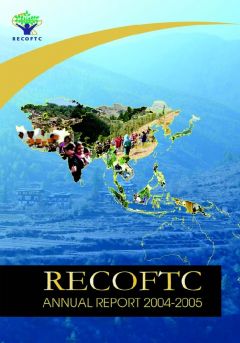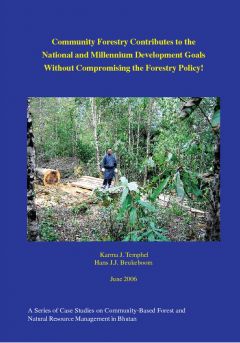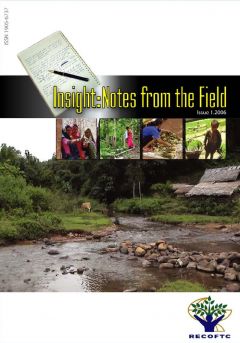Depleting natural wealth – perpetuating poverty
This paper represents part of an area of work in support of enhancing access to land and forest resources in support of rural livelihoods in Mongolia. . This synthesis report draws on field studies undertaken recently in five rural areas of Mongolia, covering all ecological zones from montane and northern taiga forest to arid forest in the Gobi. Our findings document and explain, with case studies and documentation from participatory analysis, the downward cycle of resource depletion and descend into poverty that is in action.
Improving the legal framework for participatory forestry
This paper represents part of an area of work in support of enhancing access to land and forest resources in support of rural livelihoods in Mongolia. It is based on learning emerging from an ongoing FAOsupported project called: Support to the development of participatory forest management (TCP/MON/2903). This project has involved the development (through extensive community-level consultations in forest areas) of a detailed Concept Document for the design and implementation of participatory forestry.
Asia-Pacific forestry: outlook and realities five years since APFSOS
The initial Asia-Pacific Forestry Sector Outlook Study (APFSOS) drew together the myriad forestry dimensions to provide a coherent description and analysis of the situation and prospects for forestry in the region. The study resulted in 50 working papers on a variety of forestry themes. The formal aspects of the study culminated in a comprehensive main report, published in November 1998. APFSOS provided an important roadmap for forestry sector development in the Asia-Pacific region to 2010, which is still being used to guide policy makers in the region today.
RECOFTC Annual Report 2004-2005
The first year of the 2004-2009 Strategic Plan saw much greater and systematic efforts on regional and international partnerships, including collaboration with national government and non-governmental institutions. At the same time, organizational expansion required some restructuring and more robust planning and management systems. RECOFTC's role as a non-partisan facilitator of improved community forestry has been enhanced with a strong focus on learning processes to strengthen the capacity of stakeholders.
Contribution of Community Forestry to Protected Areas Management
In most countries in the region, local communities' use of forest resources is strictly regulated. The strategy of managing forests through stringent protection and regulation has in fact not been very successful in protecting forests in Asia, and has resulted in conflicts between enforcement officers and communities. New strategies are required that acknowledge the high costs and conflicts in classical protected area management approaches and look at complementary strategies for achieving conservation by working with, rather than against, local communities.
Trends in forest ownership, forest resource tenure and institutional arrangements: are they contributing to better forest management and poverty reduction?
This FAO study document provides information on formal and legal basis of forests and forest management types in Odisha along with trends and changes; describes status and impact of forest management regimes including JFM, CFM and mainstream forest management; delineates lesson learnt and future challenges.
Insight: Notes from the Field, Issue I
Insight: Notes from the Field is a response to this need, and with this publication, we aim to give practitioners a forum to share field level cases and lessons in Community Forestry (CF) or Community-Based Natural Resource Management (CBNRM). In this edition of Notes from the Field, there are inspirational stories on Community Forestry in Thailand, development of Village Forest Councils in India, experiences on Public Hearing and Public Auditing in community user groups in Nepal, and how to improve buffer zone co-management in protected areas of Vietnam.
Community Forestry Forum: Regulatory Frameworks for Community Forestry in Asia
The Regional Community Forestry Training Center for Asia and the Pacific hosted the First Regional Community Forestry Forum for the Asia Region in Bangkok, Thailand, August 24 -26, 2005, providing a platform for senior level government delegates to discuss forestry policy frameworks and experiences from the region. Representatives from the governments of seven countries formed the principle group of participants, along with forestry and policy experts from a number of agencies working in the field of forestry in Asia.
Hanging in the Balance: Equity in Community-Based Natural Resource Management in Asia
How equitable are benefits and costs being shared in community-based natural resource management (CBNRM) programs? To what extent are the voices of marginalized groups shaping the design and implementation of community based resource management systems?
Natural resources management networking in Cambodia status, lessons learned, and future possibilities
The report introduces most of the existing natural resources management (NRM) networks in Cambodia and analyzes some of the general issues related to networking in Cambodia. The overall objectives of this report are to: Introduce some of the existing NRM networks in Cambodia; describe some of the existing general practices for network management and operation; explore some of the cultural and gender issues related to networks; identify the challenges and successes of existing NRM networks and suggest some recommendations for the future.
Protecting land rights in Ratanakiri, Cambodia
Community Forestry International trained and educated energetic extension workers, both young and old, from the indigenous Tampuan, Jarai, and Kreung tribes of Ratanakiri province. They are now part of an indigenous peoples’ network that is dedicated to protecting the land and forest rights of the unique indigenous communities of Ratanakiri province.






